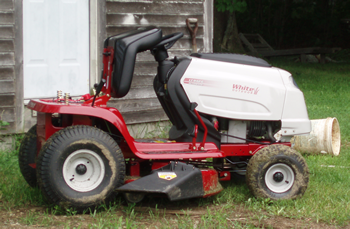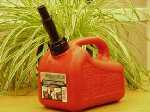Home → Homeowner Information → Tips for Handling Gasoline
Tips for Handling Gasoline

Gasoline is both flammable and toxic and one of the most dangerous chemicals you will regularly be in contact with during your life. Yet, the amount of risk it poses is largely determined by how we use…and misuse…it in our own daily routines. Here are a few useful tips to protect you, your family and the environment against possible fire and groundwater contamination:
Prevention
Buy only what you need. If you have a gallon of gas left at the end of the season then buy that much less next season. The same holds true for two-cycle gas/oil mixtures - mix only what you need. Most manufacturers do not recommend storing gasoline in power equipment for more than a month, so make sure to run your equipment dry.
Buying only what you need and not storing gasoline in the power equipment for more than a month is also good advice if your gasoline contains ethanol. Leaving gasoline in your equipment for long periods of time without some form of stabilizer can lead to gunk in the tank and varnishing. With our previous formulation of gasoline many homeowners did not see any adverse effects when using the equipment the next season. However; when using E-10 gasoline, the ethanol will act as a cleaner in the tank and remove all of the gunk and varnish. Once loosened that gunk will flow through the engine, possibly causing performance issues. Gasoline containing E-10 has an affinity for water, so improperly stored E-10 gasoline contaminated with water can undergo "phase separation". When phase separation occurs, the ethanol absorbs excess water until it separates from the gasoline. The gasoline then floats on top of this water/ethanol combination that sits in the bottom of the tank. Because most small engines receive their fuel from the bottom of the tank, the engine will not work.
If you do end up with some left over fresh gas, then add stabilizer before it gets old (generally more than 30 days since purchase). Unmixed "old"; gas can be burned in your car by diluting one part old fuel with five parts new fuel (even gasoline containing ethanol). Never burn brush with leftover gasoline! There are no cheap or easy answers for proper disposal of gasoline that has become "gummy" or contaminated with dirt and water or gasoline that has "phase separated". Check with your town to see if they plan to participate in a household hazardous waste drop-off day. You can bring your gasoline there for safe disposal. Another option is the Environmental Depot, located in Lewiston and managed by the Androscoggin Valley Council of Governments (AVCOG). It is open the first and third Saturdays of each month from May through November. Call 783 -9186 or go to Environmental Depot in Lewiston. A third option is to contact a licensed hazardous waste professional. Hazardous waste haulers will pick-up contaminated gasoline from individuals, but the cost is around $20 a gallon.
Many service stations and municipal trash transfer stations accept used crankcase oil from individuals and burn it in waste oil space heaters. Never mix left over gasoline-oil from a two-cycle engine with crankcase oil because this mixture could explode in the waste oil burner! 
Safe Storage
Store gasoline in UL- approved (red for gasoline, blue for kerosene and diesel) containers. These containers should be clearly labeled to identify the contents and fitted with a spout to allow pouring without spilling. Better yet, replace your old gas can with one of the new spill-proof gas cans.
Never store gasoline in inappropriate containers such as glass jars or plastic milk jugs. These can break or deteriorate causing a spill or worse a fire!
Store all gasoline containers preferably in a well ventilated shed or detached garage, away from the reach of children. Some of the constituents of gasoline move quickly through groundwater, so store gasoline and fuel equipment as far away and downslope from your drinking water well as possible.
Once a month check for leaks from fuel tanks, engines or storage containers. (U.L.-approved plastic containers will not rust.) Little leaks and spills can really add up and cause groundwater contamination.
Do not store gasoline for more than 30 days unless a stabilizer (available at most hardware and small engine repair shops) has been added. Also, if you are storing the gasoline over the winter or more than a month keep the container or tank 95% full. This will allow for thermal expansion of the fuel but also limit the air space, which will reduce condensation and therefore water build up.
A common question the Department has received since E-10 gasoline has arrived is: "What if the gasoline I use contains E-10?" The answer to that question is to follow the same procedures outlined for gasoline without E-10 when storing gasoline with E-10. The only difference is you may need to use a different stabilizer formulation.
Gasoline Containing Ethanol
Gasoline containing ethanol is here for the foreseeable future, so to prevent problems with your gas burning equipment it is important to follow all manufacturers recommendations. So if you are using E-10 in your small engine, then simply follow the advice given in the sections "Prevention" and "Safe Storage" shown above.
Because of ethanol's affinity for water, improperly stored ethanol-blended gasoline contaminated with water can undergo "phase separation". When phase separation occurs, the ethanol absorbs excess water until it separates from the gasoline. The gasoline then floats on top of this water/ethanol combination that sits in the bottom of the tank. Because most small engines receive their fuel from the bottom of the tank, the engine will not work. Since there are no cheap or easy answers for proper disposal of gasoline that has undergone phase separation, proper storage is your best strategy.
Do not store gasoline for more than 30 days unless a stabilizer (available at most hardware and small engine repair shops) has been added. When purchasing a fuel stabilizer it is important to ensure the stabilizer is compatible for use in gasoline containing ethanol (label may say gasohol).
Find more information on gasoline containing ethanol
For more information on the safe storage and handling of gasoline at home, on your boat or when fueling at service stations please see these off line web sites.
EPA Region 5 - Winterizing your Lawnmower - Off Site
National Fire Protection Association - Off Site
American Petroleum Institute - Off Site
Remember
- Buy only what you need…
- Use what you've got…
- Store away from your home and well…
- Watch for leaks!